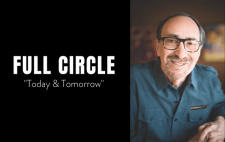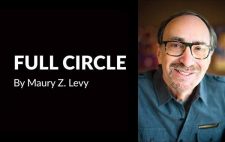My father was no stranger to fame. He knew Jack George and Joe Graboski and, most of all, he knew Tom Gola.
In this, the year of their second NBA championship, the year they pressed the Fort Wayne Pistons in five, he bought me pictures of the valiant Warriors, great 8×10 glossies with their autographs across the bottom in big, blue ink.
“What are they like?” I would ask him. “Is Tommy Gola really built like a boulder?”
My father would just smile and say, “Tommy is just like any other man, only more so.”
He would tell me, my father, that “celebrities are just like real people.” That they have their problems and their worries. It’s just that they do one thing better than other people.
“Hey,” I thought, “my father did one thing better than anyone else. He sold toys. He sold more hula hoops and Betsy Wetsy dolls than anyone else in town. It’s just that not many kids ask him for his autograph.”
“It’s just like Eddie Fisher,” he said. My sister went to school with Eddie Fisher. Our family knew his family. My uncle recorded his first song on an old Victrola in his parlor in South Philly.
“He was a good-looking kid,” my father said. “He had all those hit songs and he married Elizabeth Taylor. That was a great life, huh? Every guy wanted to be Eddie Fisher. Until Liz Taylor ran off with Richard Burton.
“Then it really didn’t matter that he had all those hits, that he made all that money. He was a sad guy who got stood up by a girl. Fame can make you rich and fame can do you in.
“And everybody’s a celebrity to somebody. When I go to the Toy Show and set up my booth, all the other toy salesmen want to come see me. To them, I’m a celebrity.”
I remembered that wisdom the day my life changed. I had a summer job working in the hardware department at Sears. Just like every other day, I brought my tuna fish sandwich to work in a brown paper bag and stashed it near the screws and nuts. And then the phone rang.
It was a school friend who was working at CBS Radio in Philly. There was a job open. They needed an associate producer on “Jack McKinney’s Night Talk,” soon to be the top-rated show in town. He could get me an interview at lunchtime. I ditched the tuna sandwich and drove up to City Line. They interviewed me. They hired me. I started that night.
I was just 20 years old, and soon I was friendly with Milton Berle and Norman Mailer. My name was mentioned on the air regularly and heard by people in 38 states. One of my jobs was to pre-interview guests, to find out what would make for good conversation on the air.
About two weeks in, I walked into what passed for a green room to prep our next guest. She was a folksinger, and she was pretty. That’s all I knew about her. She told me she was from Canada and this was her first time on radio. “Don’t worry,”
I told her. “Talk about your music. You’ll feel more comfortable. What song are you going to do for us tonight?”
“Well,” she said, “I just finished writing one today, sitting under a tree in that big square downtown.”
“Rittenhouse Square?”
“Yes, that’s it.”
“What’s it called?” I asked her.
“Both Sides Now,” she said. “Listen, can I show you the words? Will you be honest with me? I just don’t know if this is anything.”
So, I read the lyrics. I thought they were really good.
“This is great,” I said.
“Are you sure?” she asked. Hmm, a couple of weeks ago, I was stocking ratchets at Sears. Now this girl, this Joni Mitchell, wants my opinion of her new song. I thought about it. Yes, I was sure. I thought she should be very proud. And so I told her. Right out loud.












